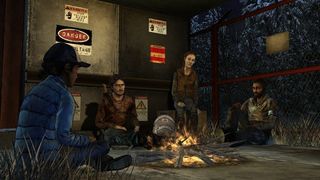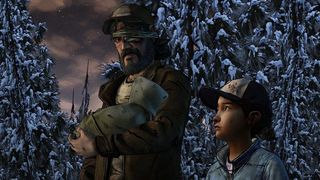The Walking Dead: Season 2 Episode 5 review

Warning: there are unmarked spoilers for all of Season 2 of The Walking Dead, including episode 5, below. Going forward, PC Gamer will review episodic games like TV episodes: critiquing and discussing the story of each episode as the season progresses, before assigning a score at the end of the season (season 2 review coming soon). Read more about how we review games in the PC Gamer reviews policy .
I cheated in episode five of The Walking Dead Season 2 . Not with a code or a hack that lets Clementine and all of her friends live happily ever after. But I did cheat, or do something that feels like cheating, to me: after finishing episode five, I went back to two moments and did things differently. I sacrificed the purity of the story, the agony of making blind decisions, to see if things would play out differently. I didn't expect the story to change so dramatically, or that replaying those decisions would completely change how I felt about the episode, but it did.
Until this episode of The Walking Dead, I was convinced that Telltale's narrative power came from the illusion of choice. If you've ever replayed any of the Walking Dead's dramatic decisions, you know what I mean. In most cases, different dialogue choices lead to the same reactions. Saving one survivor over another may affect the short term, but every path, be it bloody or guilty or stoic, intersects eventually. But the story works, because unless you replay those moments, you never know for sure. Maybe I could've saved Kenny from a beating. Maybe Luke didn't have to die.
But replaying those moments robs them of their power, right? That's what I've always thought, which is why I rarely replay sections of Telltale's games. I would be robbing myself of the impact of a death or emotional confrontation. It feels like cheating in the same way that save-scumming a game with permadeath feels like cheating.

Season 2's finale No Going Back left me with a different feeling. The climax left me so dissatisfied—and more importantly, seemed to so dramatically affect the outcome of the story—that I decided to retread my decisions. The first time, I played Clementine logically, making the choices that seemed smart, necessary for survival. The second time I played from the heart, and I got a radically different ending. This was not the illusion of choice. This was real.
The first half of the episode is an exercise in inevitability. The overall story arc plays out predictably, following the same framework of a TV drama finale. The characters drag on towards an unhappy ending; Clem, Luke, Kenny, Becky, Mike and Jane have a brief moment of happiness around a campfire before tragedy whittles down their numbers. Clem, like any good protagonist, is injured, but soldiers on. Jane and Kenny, the ultimate survivors, see their character arcs come to a head. The episode is actually more about Kenny than it is about Clementine; it not-so-subtly builds towards the realization that Kenny is a monster, sadness and loss twisting his insides until only rage comes out. Jane, meanwhile, is desperate to be the big sister to Clementine she couldn't be to her real sister.
The first hour was so predictable I mostly felt bored, like both I and the game were going through the motions. Of course Kenny was going to angrily yell at everyone and be overly protective of Rebecca's baby. That was all foreshadowed last episode. Of course the group's moment of happiness is just a lull between bad times and worse. Even the final showdown was predictable, but my appreciation for it flipped completely when I replayed my choices.
Comic deals, prizes and latest news
Sign up to get the best content of the week, and great gaming deals, as picked by the editors.

In the climax, Clementine has to choose who to trust: the sane-but-cynical Jane, or the unhinged-but-fiercely-loyal Kenny? I just couldn't bring myself to trust Kenny after two full episodes of him yelling, beating people, and insisting he get his way. I shot him, but his death felt empty. Wasted. Jane forced the fight, and helping her fulfills her character arc. But it also cheats Kenny of a natural conclusion to his. Would he have become a monster on his own, without Jane intentionally pushing him over the edge?
Replaying the ending answered that question, and the answer is no. If Kenny lives, his ending is amazing. Cathartic, tragic, and whole. He completely recognizes what he's become but keeps fighting against it to be better, and his sacrifice at the end, based on another Clementine choice, gives meaning to all his struggles. It's not exactly a happy ending, but it's a powerful one.
Playing the endings in the order I did actually made Kenny's ending more moving; it felt like I'd discovered the “real” ending the second time around, the one that offered the greatest sense of closure. It also impressed upon me how many branching paths Telltale has to establish, and then wrangle together, over the course of an episodic season. And I was surprised by how much more I cared about the ending when I knew I had controlled how it played out. That behind-the-scenes knowledge enhanced, rather than sabotaged, my experience of the story.
I suspect that I got to make those choices because season two's ending won't lead directly into season three. In fact, each one seemed like a fitting open-ended sendoff to Clementine's story. She becomes a fearless loner, or a finds peace in a new society, or strikes out to survive with a reformed Kenny or trustworthy Jane by her side. Perhaps this is it for Clementine. If so, she could've had a better final episode—like much of season two, episode five barely offered opportunities to talk to characters during downtime or explore—but those endings will stick with me.
In my mind, Kenny's still out there somewhere, mending the pieces of himself that broke along the way. I'd be happy if season three let me keep that image and moved on to something new.

Wes has been covering games and hardware for more than 10 years, first at tech sites like The Wirecutter and Tested before joining the PC Gamer team in 2014. Wes plays a little bit of everything, but he'll always jump at the chance to cover emulation and Japanese games.
When he's not obsessively optimizing and re-optimizing a tangle of conveyor belts in Satisfactory (it's really becoming a problem), he's probably playing a 20-year-old Final Fantasy or some opaque ASCII roguelike. With a focus on writing and editing features, he seeks out personal stories and in-depth histories from the corners of PC gaming and its niche communities. 50% pizza by volume (deep dish, to be specific).
Most Popular






